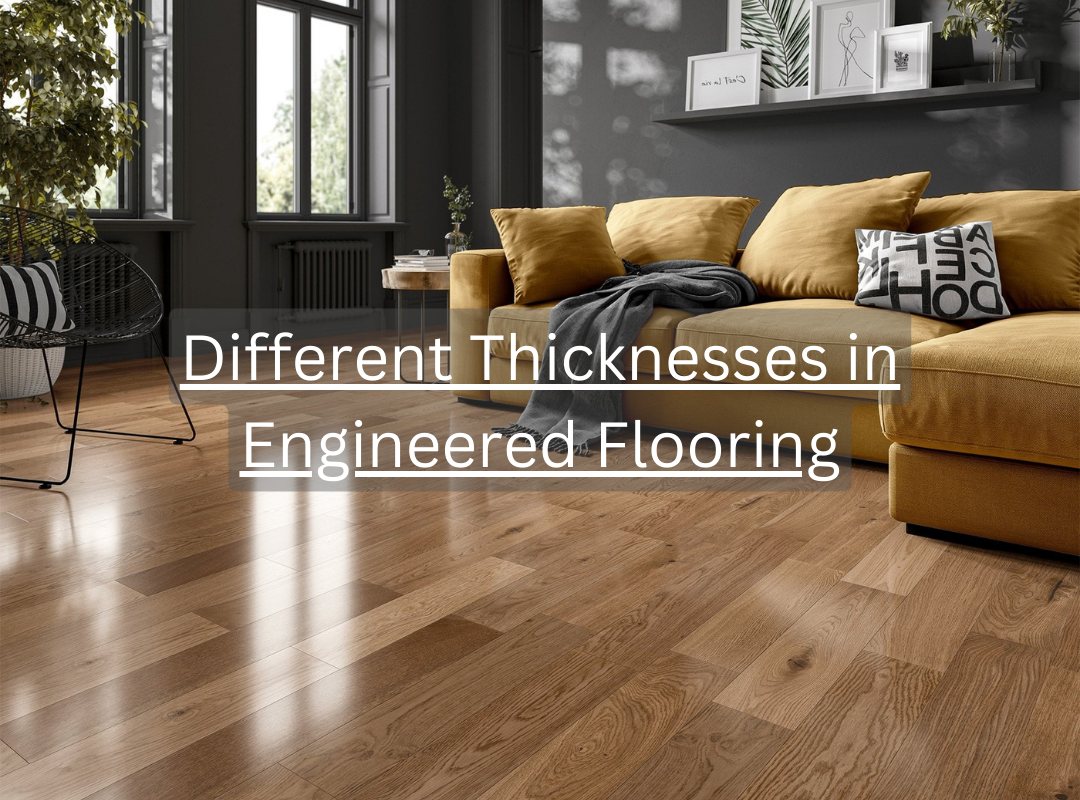6 Jun 2024
Different Thicknesses in Engineered Flooring
Uncover the factors that contribute to the varying thicknesses and veneers in engineered flooring.
Understanding Engineered Flooring Construction
Engineered flooring is a type of flooring that consists of multiple layers of wood veneer stacked together and bonded with adhesives. These layers are usually composed of a hardwood or plywood core with a thin layer of hardwood veneer on top. This construction method gives engineered flooring its unique properties, such as increased stability and improved resistance to moisture and temperature changes than solid wood.
The thickness of engineered flooring can vary depending on the manufacturer and the specific product. The different thicknesses serve different purposes and are designed to meet the needs of different installation scenarios.
Importance of Thickness in Engineered Flooring
The thickness of engineered flooring plays a crucial role in its overall performance and durability. A thicker flooring option generally provides better stability and resistance to wear and tear. Thicker flooring also offers more flexibility for sanding and refinishing in case of damage or changes in style preferences.
In addition, the thickness of engineered flooring can impact the sound insulation properties of the floor. Thicker flooring tends to provide better sound insulation, reducing the transmission of noise between floors and improving overall acoustic comfort.
Benefits of Different Veneer Thicknesses
The veneer thickness refers to the thickness of the top layer of hardwood that is visible once the flooring is installed. Different veneer thicknesses offer different benefits and aesthetic options for engineered flooring.
Thicker veneers, typically ranging from 2 to 6 millimeters, provide the advantage of being able to be sanded and refinished multiple times. This means that if the surface of the floor becomes scratched or worn over time, it can be restored to its original appearance through sanding and refinishing.
Thinner veneers, on the other hand, are more cost-effective and can still provide a beautiful and durable flooring option. They are suitable for areas with light to moderate foot traffic and can be a good choice for spaces where budget is a concern.
Ultimately, the choice of veneer thickness depends on factors such as the desired appearance, durability requirements, and budget considerations.
Factors Influencing Thickness Choices
Several factors can influence the choice of thickness in engineered flooring.
One important factor is the subfloor condition. If the subfloor is uneven or has height restrictions, a thinner flooring option may be preferred to ensure a seamless installation without the need for extensive subfloor preparation.
Another factor to consider is the location and intended use of the flooring. For example, high-traffic areas such as hallways and living rooms may benefit from thicker flooring options that offer increased durability and resistance to wear and tear.
Budget is also a significant consideration. Thicker flooring options with thicker veneers tend to be more expensive due to the higher amount of hardwood material used.
Lastly, personal preferences for the look and feel of the flooring can also influence the choice of thickness. Some individuals may prefer the substantial feel and appearance of thicker flooring, while others may prefer the sleek and minimalistic look of thinner flooring.
Choosing the Right Thickness for Your Space
Choosing the right thickness for your space requires careful consideration of various factors.
First, assess the level of foot traffic in the area. Higher foot traffic areas may benefit from thicker flooring options to ensure longevity and durability.
Next, consider the subfloor condition and any height restrictions. Budget is another important factor. Determine how much you are willing to invest in your flooring project and find a thickness that aligns with your budget.
Lastly, consider your personal preferences for the appearance and feel of the flooring. Thicker flooring options may provide a more substantial look and feel, while thinner options can create a sleek and minimalist aesthetic.
By considering these factors and consulting with flooring professionals, you can choose the right thickness for your space and enjoy the benefits of engineered flooring.
Be sure to check out all of our Engineered Flooring options on our website here.


 Quickstep
Quickstep COREtec
COREtec Egger
Egger Balterio Collection
Balterio Collection Chene Firmfit
Chene Firmfit Luvanto
Luvanto Belle Flooring
Belle Flooring Capital
Capital Luvanto Design
Luvanto Design Luvanto Click
Luvanto Click TLC Vinyl Flooring
TLC Vinyl Flooring Rhinofloor
Rhinofloor Kaindl
Kaindl Lifestyle Floors Love AQUA
Lifestyle Floors Love AQUA Polyflor
Polyflor Life Flooring
Life Flooring Capital Creation
Capital Creation LG Hausys
LG Hausys Krono Swiss
Krono Swiss Fusion Flooring
Fusion Flooring Columbus Flooring
Columbus Flooring Kersaint Cobb
Kersaint Cobb Bostik
Bostik Moduelo
Moduelo Krono Original Xonic
Krono Original Xonic Palletforce
Palletforce Meister Flooring
Meister Flooring